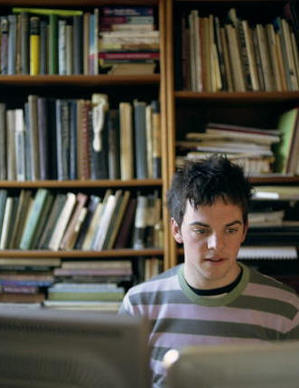
"Even to a writer who is being intentionally obscure or wild of tongue we can say, 'Be obscure clearly! Be wild of tongue in a way we can understand!'" -- Strunk & White, "The Elements of Style" (musical adaptation by Nico Muhly)
I love it when artists known for their work in one medium show a passionate investment in another. Over the weekend I stumbled upon composer Nico Muhly's blog. This is the guy who studied with John Corigliano and Christopher Rouse, made two albums of his own music (Speaks Volumes and Mothertongue), and has collaborated with Philip Glass, Björk, Antony and the Johnsons, Bonnie "Prince" Billy (aka Will Oldham, of "Old Joy" and "Wendy and Lucy") and Grizzly Bear, among others. And he's the composer of the scores for "Choking Man," "Joshua" and "The Reader." (The middle one is actually a pretty good movie.)

Muhly graduated (er, "was graduated") from Columbia in 2003 with a degree in English Lit (my major, too!) and wrote a cantata adapted from Strunk & White's "The Elements of Style," so he clearly has an interest in English prose. This summer he was reading a book I'm curious about, Dave Cullen's "Columbine," and while he found the subject and the reporting revealing, the writing style really started to bug him. Here, Muhly begins by quoting Cullen (in italics):
There is a house, outside of Laramie. It's a rugged Wyoming town on the fringes of the Rockies. That's where Dave and Linda Sanders were going to retire.
I haven't yet read Cullen's "Columbine," but that's not the point. The point is that I'm thrilled to see somebody actually talking about the meaning of grammar and punctuation, the shape of sentences, the choices behind them and what they reveal or express. That's right: Style is content. Every character you type matters enormously, and the patterns you create with them are your style. As I keep saying about movie direction, every frame represents a plethora of decisions, and what the director chooses to do as each one goes by (24 times per second) is the manifestation of the filmmaker's sensibility. It is the movie.
As you may know, I am a big fan of run-on sentences, stuffed with parenthetical interjections, commas, lists, tangents, associations, qualifiers and digressions. Not that I can help it -- that's just the way things come out. (When I was a teenager, reading Joseph Heller was like finding the only other person I knew who spoke my language.) While Cullin's truncated sentences may have reminded Muhly of something out of the Bad Hemingway Competition, it makes me think of the choppy editing and sloppy compositions so popular in American movies right now, Hollywood and "indie." I find myself thinking, "Why is the camera there?" or "Why is that cut there?" all the time. The spastic, staccato editing rhythms are more than just annoying to me, they're as dull as listening to a jackhammer. (One of the great pleasures of watching "Inglourious Basterds" is that Quentin Tarantino knows exactly how to frame his shots and when to cut. Glenn Kenny counts only 16 major scenes in the movie -- and I'd love to know the average shot length, which has to be well above average.)
So, I don't have any big point to make here -- just a salute to Nico Muhly for bothering to notice and remark upont... the elements of style.





